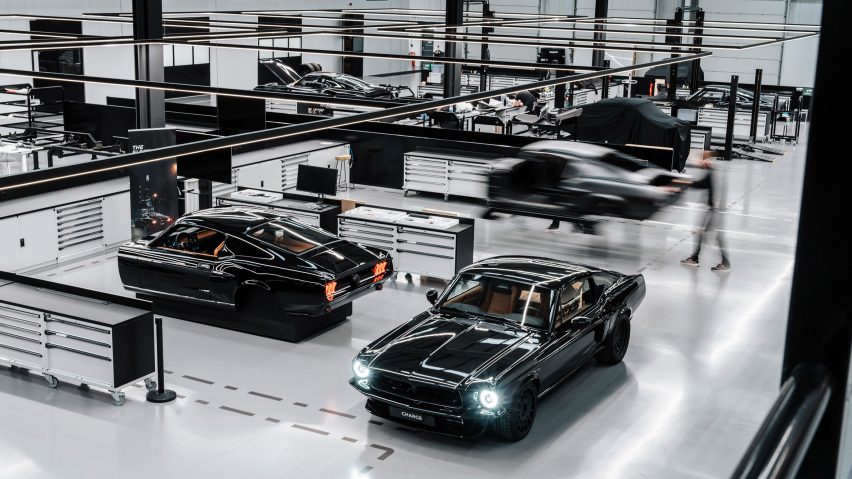UK studio Most Architecture has converted an industrial shed in west London into an all-black-and-white showroom and production facility for electric car start-up Charge Cars.
Created to manufacture Charge Cars' first vehicle the '67 – an all-electric version of the 1960s Ford Mustang Fastback built using components from electric vehicle brand Arrival – the facility also acts as an office and showroom.
"Charge designs and makes its unique cars in a single facility," said Most Architecture founder Olga McMurdo. "Like an open-kitchen restaurant, everything is on display to the staff and customers."
"So we created an environment that allows immediate access to every aspect of the process from design through to production," she told Dezeen. "The factory, and all of its contents, are at once an agile design and manufacturing centre, a customer showroom, and a design statement."
The facility in Stockley Close, west London, was designed around the idea of promoting a connection between Charge Cars' clients and the engineers building and customising the cars.
At its centre is a large open workshop where the cars are built and customised, which is overlooked by various offices and meeting spaces.
"Our client came to us with an ambition to re-define a classic design icon using cutting-edge electric vehicle technology and to create a customer experience that engenders a visceral response to the product, and the process of creating it," said McMurdo.
"Their space had to accommodate both the manufacturing and the design process, facilitating teamwork and recreation, testing, a showroom, and areas for customer engagement," she continued.
"All that had to happen within one architectural volume, and so the primary challenge was to facilitate all of these activities simultaneously and symbiotically, whilst projecting a clear and coherent design statement reflecting the client's philosophy."
Unlike the majority of car factories, the Charge Cars facility was designed so that its customers can visit at any time to observe how the vehicle is designed and assembled.
"Charge wanted the customer journey to be mapped out by the design of the building," said McMurdo.
"The customer's access to, and experience of, the factory is an integral part of the product," she continued.
"They have a personal relationship with the engineers that are making their car, and are able to see the car as it is being constructed."
Most Architecture designed the spaces with a stripped-back aesthetic united by a largely white and black colour palette, including a black light fixture above the building's entrance.
"The white and the black amplify each other by contrast, representing the fusion of a laboratory and a garage, and the constant dynamic between research and production," explained McMurdo.
"Using this pallet we also wanted to make an impactful design statement on entry to the building. The result was a large anamorphic light fixture, which coalesces into a Feynman diagram from a single vantage point, becoming a composition of independent pieces."
Other recent electric car factories featured on Dezeen include a black steel and glass facility designed by Snøhetta for car brand Polestar in Chengdu, China. In Sweden, Danish architecture studio Cobe is designing a development centre for Chinese car manufacturer Geely, which it describes as a "chamber of secrets".
The photography is by Paul Riddle.
Project credits:
Client: Charge Cars
Lead architect: Most Architecture
Interior concepts: Evgeniy Bulatnikov
Mechanical engineer: Airon
Electrical engineer: Smart Techno Systems
Structural engineer: HLS Structural
Lighting: Gaismas Magija
Building control: The Building Inspectors
Wind consultant: Buro Happold
Fire engineer: QFSM
CDM advisor: Andrew Goddard Associates
Main contractor: Hansa Group
Steel mezzanine contractor: System Store Solutions
Lighting manufacturer: Esse-Ci

